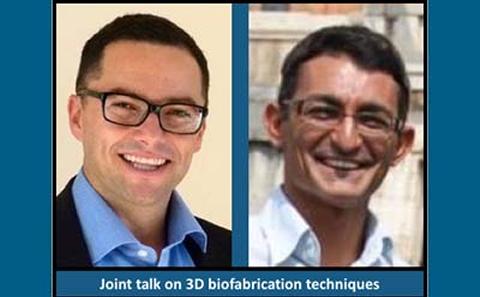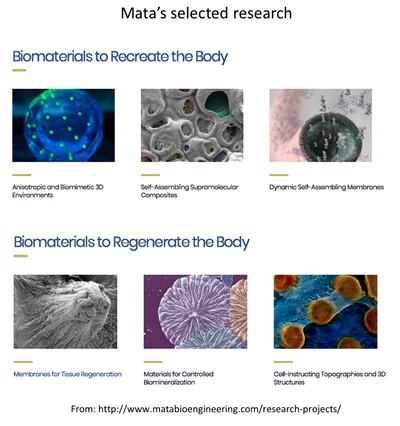“3D printing workshop, followed by a joint talk on 3D fabrication techniques for tissue engineering” by Prof Alvaro Mata and Prof Giovanni Vozzi Seminar

- Date:
- 16 March 2018
- Venue:
- The workshop and exhibition will be at 12:00 in building 53 room 3028 The seminar will be at 13:00 in building 53 room 4025
Event details
Bioengineering seminar series
Workshop details
The workshop and exhibition will be at 12:00 in building 53 room 3028
The workshop will provide a technical experience for the public who has never, or rarely, encounter 3D printing technology. In this, Gianluca Cidonio will guide an educational but yet interactive workshop focusing on application of this technology for tissue engineering and regenerative medicine with particular examples of what the Bone & Joint Research group at University of Southampton is working on at the moment.
Joint talk abstract (seminar)
The seminar will be at 13:00 in building 53 room 4025
Prof Alvaro Mata
“Nature engineers functional materials with a high level of molecular organization across scales, which results in properties such as outstanding stiffness and elasticity, the capacity to grow and self-heal, or the ability to acquire complex hierarchical structures. Our research group is developing biofabrication approaches based on the design and capacity to manipulate peptides and proteins. The talk will present three new supramolecular engineering techniques that incorporate dynamic self-assembly, disordered proteins, and bioprinting to develop materials with advanced properties in a simple and tunable manner. We are using these techniques to create dynamic scaffolds for tissue engineering (Inostroza-Brito, Nature Chemistry 2015 - Drawn out proteins make self-healing scaffolds (Chemistry world)), hierarchical structures (Hedegaard et al, Advanced Functional Materials 2018 - 3Dprint.com article), and 3D anisotropic environments (Aguilar et al, Advanced Functional Materials 2018 - PHYSORG article).”

Prof Giovanni Vozzi
“A biological tissue is a composite material with “bottom-up” hierarchical structure that is closely related to its heterogeneous function. The extracellular matrix modulates biochemical and biophysical signalling, and its rigidity is an important microenvironmental parameter that regulates the spatiotemporal dynamics of intercellular signalling. For this reason, many studies are focused on fabricating scaffolds processed at multiple scales with structural and mechanical properties that are optimal for eliciting specific response or mimic those found naturally. These scaffolds have to present large surface areas that have appropriate topology and biochemical cues (e.g, ligands) at the nanoscale for tissue adhesion, while also exhibiting integral porosity to allow for the exchange of molecules that maintain cellular function. In this talk, the use of a multiscale and multimaterial process will be presented to develop 3D in vitro model that can mimic the 3D complexity of natural tissue. These novel 3D in vitro models can be used for the study of physio-pathological condition and for the analysis of effects on cell activities of different biomolecule and/or drugs.”

Speaker information
Professor Alvaro Mata, Queen Mary University, UK . was born in San José, Costa Rica and holds a Bachelor's Degree from the University of Kansas, USA, a Master's Degree from the University of Strathclyde, UK, and a Doctor of Engineering Degree from Cleveland State University, USA. During his doctorate he worked at The Cleveland Clinic Foundation under the direction of Prof. Shuvo Roy. From 2005-2008 he worked as a Postdoctoral Fellow with Prof. Samuel I. Stupp at Northwestern University in Chicago, developing self-assembling materials for regenerative medicine. From 2008-2013 he was Head of the Nanotechnology Platform at Parc Científic Barcelona in Spain and is currently Professor in Biomedical Engineering and Biomaterials. In 2015 he was named Director of the Institute of Bioengineering at QMUL and Co-Lead of the Bioengineering Domain of the Life Sciences Initiative at QMUL. His work has been published in journals like Science, Nature Materials, and Nature Chemistry and awards such as the 2005 Clodomiro Picado Twight Technology Award, the 2006 Baxter Early Career Award in Bioengineering, a Ramón y Cajal Award from the Government of Spain in 2009, and an ERC Starting Grant in 2012.
Professor Giovanni Vozzi, University of Pisa, Italy. was graduated in Electronic Engineering in 1998 at the University of Pisa. In 2002 he got a PhD in Bioengineering at Politecnico di Milan. From 1/05/2006 to 28/12/2014 he was Assistant Professor of Industrial Bioengineering at the Department of Ingegneria dell’Informazione of University of Pisa. Currently he is Associate Professor of Bioengineering at the Department of Ingegneria dell’Informazione of University of Pisa He is member of Directors board of International Society for Biofabrication, of IEEE and Of National Group of Bioengineering. His research interests are: 1) development of new micro and nanofabrication techniques; 2) development of bioreactors; 3) mechanical, chemical and cell characterisation of new biomaterials; 4) development of cell models through the fusion of Automatic Controls principles and of cell biochemical reactions.